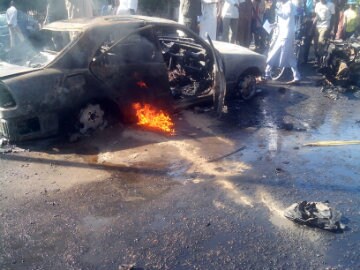
File Photo: Nigeria - Residents stand on January 14, 2014 near a burning car in Maiduguri moments after 17 people were killed when an explosion ripped through a busy market
Abuja, Nigeria:
An apparent car bomb exploded on a busy road in Nigeria's capital on Thursday night and a hospital worker said at least nine people died.
The bomb exploded near a checkpoint, near the site of an April 14 bombing that killed at least 75 people, officials and witnesses said.
A hospital worker said he counted at least nine bodies ferried by ambulance to Asokoro General Hospital. He spoke on condition of anonymity because he is not allowed to give information to reporters.
Civil Defense Corps spokesman Eman Ekeh said rescuers have rushed to the scene on May Day, a public holiday in the West African nation that is hosting the World Economic Forum on Africa next week in Abuja.
Ekeh said there were casualties, but he had no idea of how many.
Witnesses said a car laden with explosives appeared to blow up near the checkpoint where traffic had built up as soldiers and police search vehicles. The checkpoint was set up after the bombing earlier this month. The witnesses spoke on condition of anonymity because of fears for their safety.
The Boko Haram Islamic extremist network claimed the April 14 bombing at rush hour at a busy bus station in a working class suburb. It killed at least 75 Muslims and Christians, and wounded 141.
Hours later, the militants kidnapped more than 250 teenage girls at a school in the remote northeast, which is their stronghold. About 50 of the girls escaped their captors, but 200 remain missing in a growing embarrassment for Nigeria's government and military.
President Goodluck Jonathan told a May Day rally in Abuja earlier Thursday that the perpetrators must be brought justice.
"We shall triumph over all this evil that wants to debase our humanity or obstruct our progress as a nation," he vowed. "Those who want to re-define our country to be seen as a country of chaos will never succeed."
Boko Haram, which means "Western education is sinful," wants to create an Islamic state in Nigeria, Africa's biggest oil producer with a population of about 170 million almost equally divided between Christians and Muslims.
The bomb exploded near a checkpoint, near the site of an April 14 bombing that killed at least 75 people, officials and witnesses said.
A hospital worker said he counted at least nine bodies ferried by ambulance to Asokoro General Hospital. He spoke on condition of anonymity because he is not allowed to give information to reporters.
Civil Defense Corps spokesman Eman Ekeh said rescuers have rushed to the scene on May Day, a public holiday in the West African nation that is hosting the World Economic Forum on Africa next week in Abuja.
Ekeh said there were casualties, but he had no idea of how many.
Witnesses said a car laden with explosives appeared to blow up near the checkpoint where traffic had built up as soldiers and police search vehicles. The checkpoint was set up after the bombing earlier this month. The witnesses spoke on condition of anonymity because of fears for their safety.
The Boko Haram Islamic extremist network claimed the April 14 bombing at rush hour at a busy bus station in a working class suburb. It killed at least 75 Muslims and Christians, and wounded 141.
Hours later, the militants kidnapped more than 250 teenage girls at a school in the remote northeast, which is their stronghold. About 50 of the girls escaped their captors, but 200 remain missing in a growing embarrassment for Nigeria's government and military.
President Goodluck Jonathan told a May Day rally in Abuja earlier Thursday that the perpetrators must be brought justice.
"We shall triumph over all this evil that wants to debase our humanity or obstruct our progress as a nation," he vowed. "Those who want to re-define our country to be seen as a country of chaos will never succeed."
Boko Haram, which means "Western education is sinful," wants to create an Islamic state in Nigeria, Africa's biggest oil producer with a population of about 170 million almost equally divided between Christians and Muslims.

